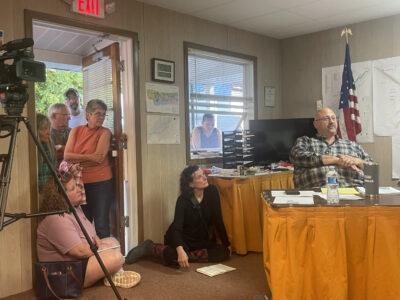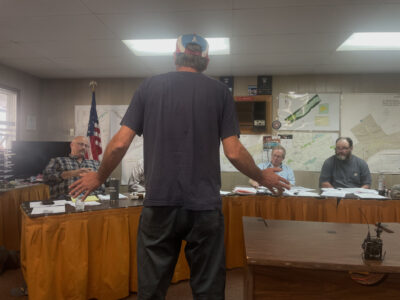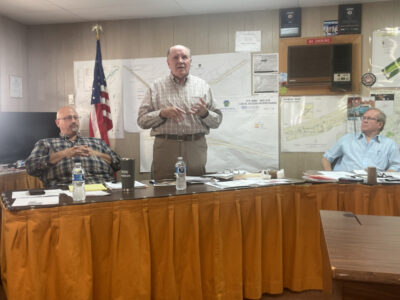‘Our Way of Life’: Marion Twp. postpones rezoning after community response; public comment expected to continue Sept. 24
- HUNTER SMITH/THE EXPRESS Eager to voice their concerns, so many residents arrived at the township building many had to stand outside to listen to the hearing.
- HUNTER SMITH/THE EXPRESS Seated from left to right, Marion Township Supervisors Orie Hanley, Archie Gettig, Jr. and Herb Chapman listen as a township resident voiced his frustration about the rezoning proposal.
- HUNTER SMITH/THE EXPRESS Supervisor Orie Hanley, Left, and Archie Gettig, right, listens to Solicitor Louis T. Glantz, center, as he speaks to the crowd about the hearing process.
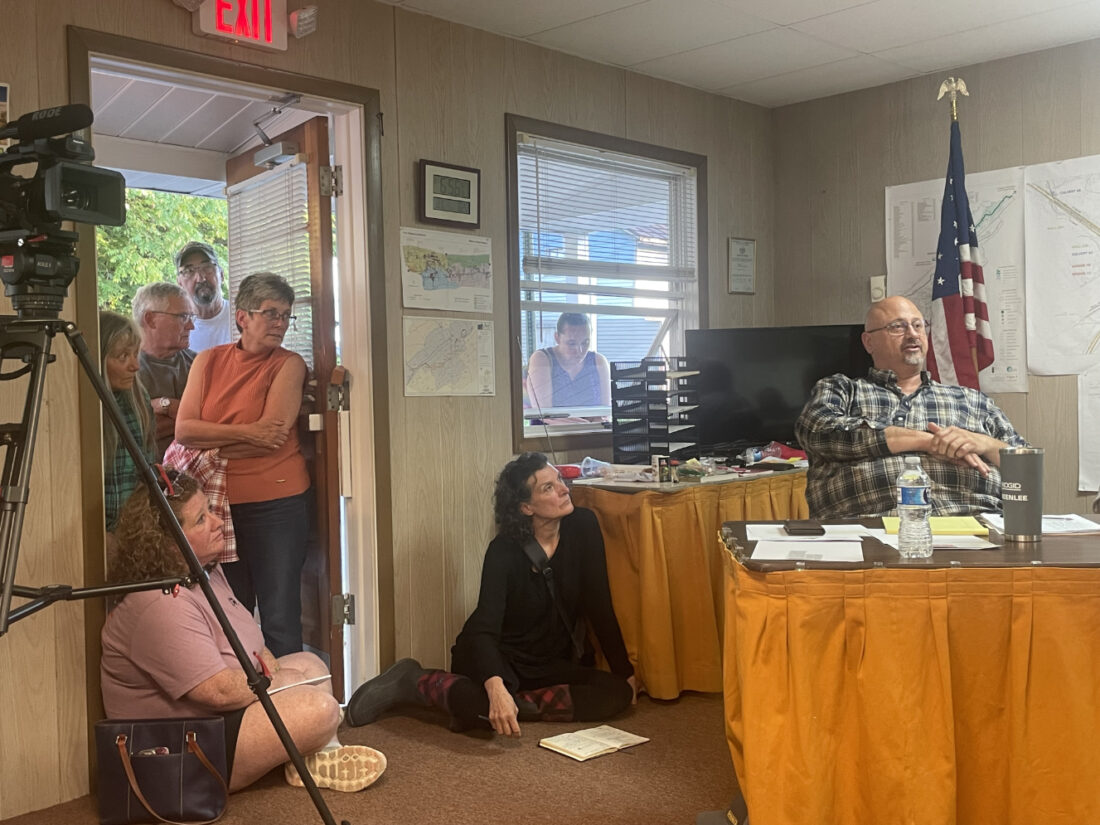
HUNTER SMITH/THE EXPRESS Eager to voice their concerns, so many residents arrived at the township building many had to stand outside to listen to the hearing.
JACKSONVILLE — With the township building overflowing, residents crowded outside, straining to hear through doors and windows as tempers flared at Marion Township’s rezoning hearing.
So many raised objections Wednesday evening that rezoning 17 parcels along Walt Road near the I-80 Jacksonville exit for highway commercial use would threaten the environment, safety and the community’s character that township supervisors postponed the decision until later this month.
Local officials say rezoning is necessary to relocate the township’s highway commercial district displaced by the I-80/I-99 interchange, which is currently under construction near the Bellefonte exit of Interstate 80.
In June, supervisors began to explore moving the district to the Jacksonville Road exit, which will become the township’s only direct interstate access point.
“Every township in the Commonwealth of Pennsylvania is required to have a zone for everything,” Township Solicitor Louis T. Glantz said. “You may not like it, but that’s the law.”
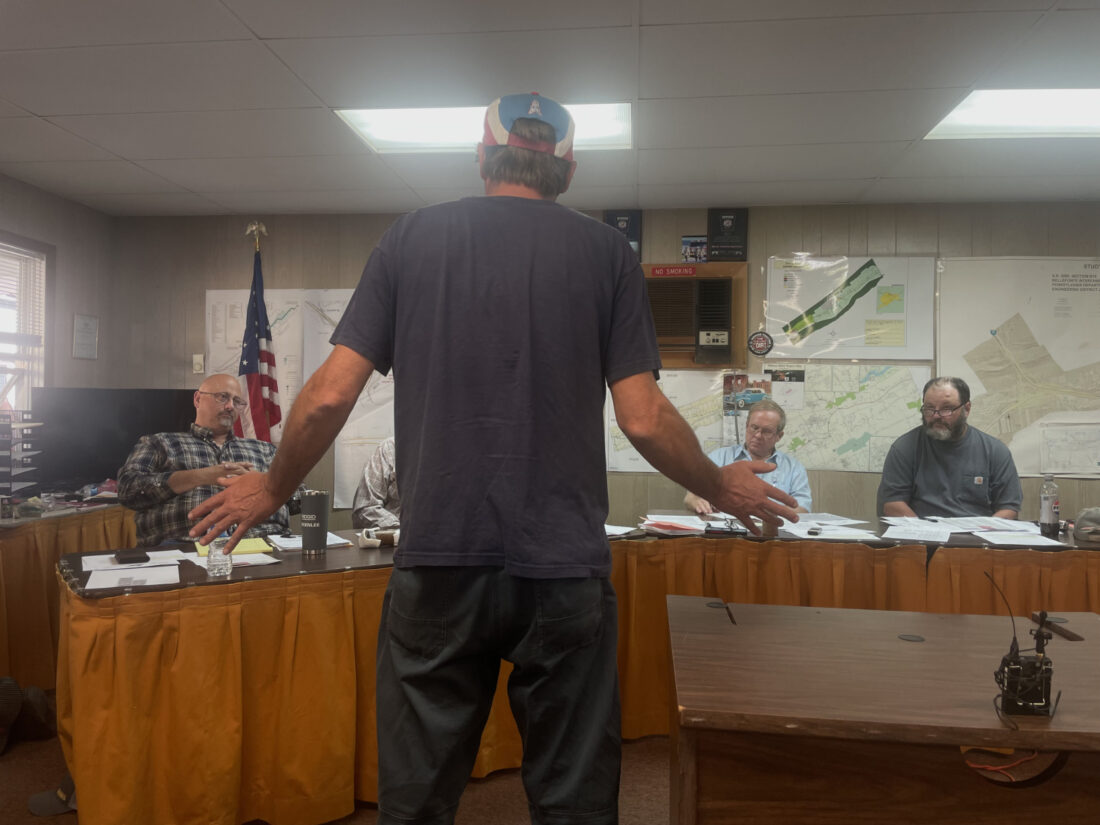
HUNTER SMITH/THE EXPRESS Seated from left to right, Marion Township Supervisors Orie Hanley, Archie Gettig, Jr. and Herb Chapman listen as a township resident voiced his frustration about the rezoning proposal.
In August, Centre County officials disputed the claim that state law compels municipalities to change zoning district designations, but Glantz argues that exclusionary zoning principles established in court do. According to the solicitor, this means that failing to designate a zone for every use could expose the township to lawsuits.
“That’s what concerns me as a lawyer,” Glantz said. “The last thing you want is for a developer to come in and say, ‘I’m going to put it here and you can’t even tell me exactly where, or what the restrictions are, because your ordinance is exclusionary.'”
Before opening the floor to the public, Glantz said discussions were already underway about reducing the size of the proposed commercial area, which is already a major win for residents.
Glantz said the township’s initial proposal represented the “maximum practical size” of the highway commercial district, but current plans would limit development to roughly 40 acres, which is far smaller than the more than 200 acres previously floated. He also suggested that development would be restricted to the west side of Walt Road.
Onvo
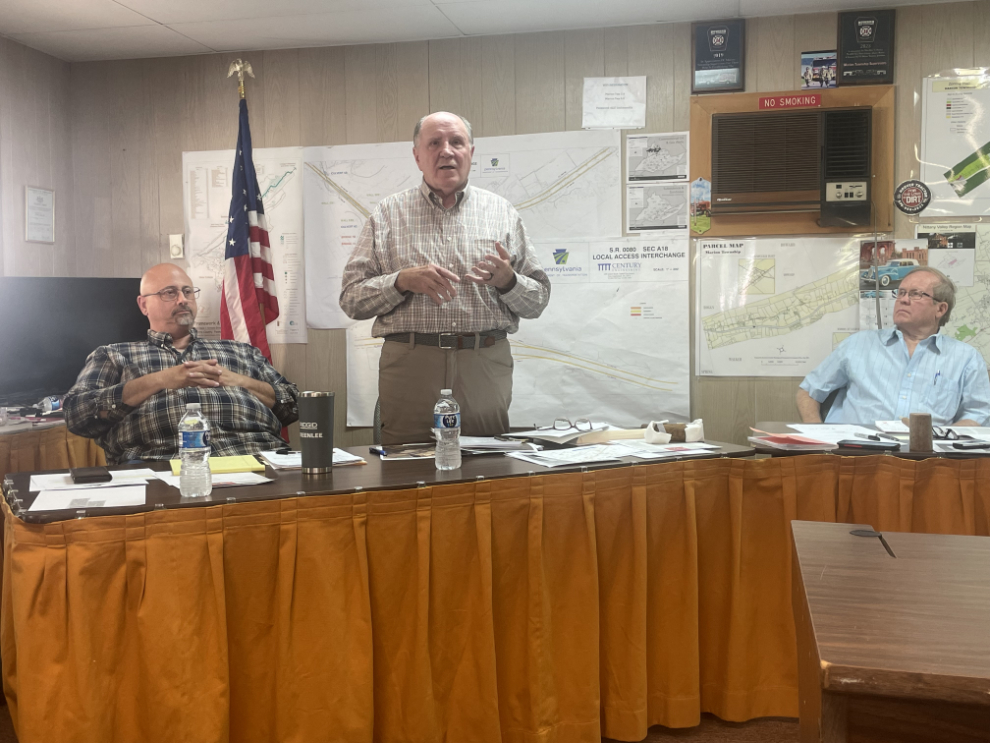
HUNTER SMITH/THE EXPRESS Supervisor Orie Hanley, Left, and Archie Gettig, right, listens to Solicitor Louis T. Glantz, center, as he speaks to the crowd about the hearing process.
The rezoning process was instigated, at least in part, by Scranton-based travel plaza company Onvo, which eyed 16 acres in that area for potential commercial development.
Although the township solicitor stressed at the hearing that Onvo had not submitted a development application and that the rezoning was not directly tied to their attendance at the June meeting, minutes from the June 11 session reveal that Onvo is “prepared to move ahead” with its plans if the rezoning is approved.
Additionally, according to the township’s July 9 meeting minutes, Supervisor Archie Gettig, Jr. said Onvo indicated they would cover the expenses associated with the rezoning.
Many of the township’s key concerns center on the possibility of a travel plaza, which residents fear could bring crime, noise and environmental degradation.
RESIDENTS’ CONCERNS
Environmental impact
Marion Township residents say they cherish their community for its rural character and loathe to see it commercialized like nearby Benner Pike, which has undergone rapid development in part due to its proximity to Penn State.
That value is echoed in Centre County’s regional planning documents.
The township belongs to the Nittany Valley Regional Planning Commission and adopted both the 2006 and 2019 versions of the Nittany Valley Regional Comprehensive Plan, which serves as a framework for guiding growth and development in the region. Within that plan, the 17 parcels now under consideration for rezoning were designated for agricultural preservation, agricultural development and conservation.
“The deviation from agriculture and conservation, which are designed to protect farmland, wooded slopes and water, to the highway commercial zoning, which is designated to meet minimum standards of health, safety and welfare, is a significant departure,” said township resident Lisa Ford, who alongside fellow resident, Andrea Royer, oversees a local Facebook group dedicated to the rezoning, which has become a hub for sharing information and amplifying community concerns. “I choose our rural atmosphere and clean water over just meeting the minimum standards.”
Royer, a 12-year resident who moved to Marion Township for its rural and safe environment, voiced particular concern about Onvo’s environmental track record, which she and others argue has been poor, especially with respect to groundwater contamination.
“Once that happens there isn’t remediation. It takes years to fix that,” Royer said.
Underlying the residents’ concerns is the fact that Marion Township lacks public water and sewer infrastructure, leaving residents dependent on private wells and septic systems.
Ford said one Amish neighbor has already seen crop erosion from runoff linked to construction in the area, while others have reported unusual cloudiness in their drinking water to The Express.
While water is central to the residents’ concerns, they extend farther. Longtime resident Valerie Stover Anderson said she has already witnessed the impacts of regional growth on her family farm.
“When I was a 10-year-old girl in 1964, out on that farm, I could look up every night and see the Milky Way. I can’t see it now most nights. The light pollution from everywhere around has made my dark sky no longer dark,” she said.
Others voiced unease about traffic noise, such as Jake brakes and frequent horn honking, while still more pointed to the likelihood of increased litter, which is already a problem along the interstate.
Safety
For some residents, the rezoning debate is as much about safety as it is about land use.
Annie Moyer, a 39-year resident, recalled that when she moved to Marion Township from Lock Haven decades ago, she was warned that crime in the township was a problem — but it was mostly confined to the interstate on the outskirts of the community. She and others worry that introducing a travel plaza would draw crime deeper into their relatively quaint neighborhoods.
“The addition of a travel plaza to our community would bring not only increased traffic, but an increase in criminal and undesirable activities which would no longer allow me to feel safe in my home and in my neighborhood,” said Hope Frey, a 25-year resident, who also expressed concern about declining property values.
Andrea Royer raised the risk of human and drug trafficking, while others warned of the potential for sexual abuse in commercial spaces of this kind. Royer claimed that as many as 30 percent of sex traffickers pass through travel plazas and truck stops, though that figure could not be independently verified by The Express.
“Please leave the crime on the periphery of our township. Don’t invite it in,” Moyer urged supervisors.
Moyer’s concerns for safety are also for the township’s Amish residents who regularly use the roadways.
“Their community has church service right across the road, and I’m telling you, when they leave, and they’re on that blind turn, you just hold your breath and pray for their safety,” said Moyer, who has concerns about increased traffic and the potential for accidents.
Transparency, process
and community impact
Beyond environmental and safety issues, many residents criticized the rezoning process itself, arguing that it has been rushed and lacks transparency.
“This is the most significant decision that I’m aware the supervisors have had to make regarding the future of how the township builds itself out,” said Matt Ford, husband of resident Lisa Ford.
He urged officials to slow down, gather more data and give residents a clearer picture of the long-term impacts.
Others threatened to vote out supervisors up for reelection this year if their concerns are ignored.
More still pressed for a more deliberate approach to shaping growth.
“I’m against development without us having some sort of plan in place that gives us control over what happens,” said Andrea Royer, who added, “What I care about is that what we put here fits. It makes sense for the people that live here.”
Residents also emphasized the broader lifestyle impacts at stake.
“We chose to live here in Marion Township because of the attraction of living in this beautiful, rural, quiet and safe community. As our township supervisors, would you please ensure that the quality of life for the citizens of Marion Township is protected and that all our concerns are taken into consideration?” asked Hope Frey.
For Greg Parsons, the township’s lack of gas stations or convenience stores is part of its appeal. “We don’t live near a convenience store or gas station, and it’s kind of by design,” he said.
Others worried the rezoning would fundamentally alter the township’s character.
“Consider the farmlands, the people, the traffic, our way of life,” urged resident Deb McCloskey.
A POSSIBLE SOLUTION
Though it took nearly two full hours of discussion to reach a common understanding with township residents, Glantz proposed implementing conditional use ordinances to regulate large-scale developments in a way that would meet legal requirements while addressing residents’ concerns.
He explained that reasonable space for development must be allowed, but environmental and traffic impact studies, setbacks, screening and limits on noise and light could help limit its negative impacts.
Because of the number of residents who signed up to speak, supervisors postponed a decision and will continue the hearing later this month.
The continuation is tentatively scheduled for Sept. 24 at 5:30 p.m. at the Howard Fire Hall, pending availability, after which the board is expected to vote on how to proceed.

